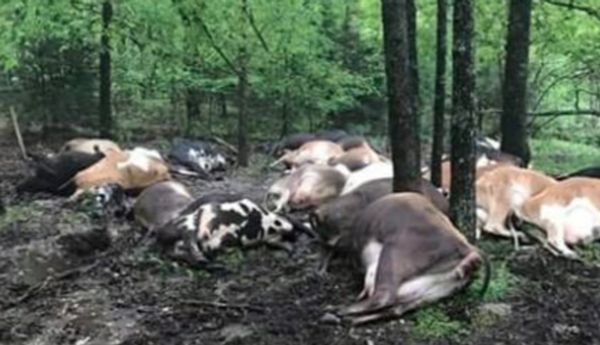A recent bout of severe weather in Missouri left a trail of chaos and devastation in its wake. One farmer, Jared Blackwelder from Springfield, experienced a tragic and heartbreaking outcome.

On a typical Saturday morning, Jared and his wife Misty were going about their routine of feeding their dairy cows. Unbeknownst to them, a storm was brewing in the distance. Ignoring the rumble of thunder and flashes of lightning, they continued with their daily tasks, unaware of what was to come.
Later that day, as Jared returned to the pasture to gather the cows for the evening milking, he was met with a sight that no farmer should ever have to witness – the lifeless bodies of all 32 cows piled on top of each other. It was a devastating scene that left both Jared and Misty heartbroken.
While it’s not uncommon for cows to be affected by lightning strikes, what made this tragedy particularly devastating was the sheer number of cows that were lost. Stan Coday, the president of the Wright County Missouri Farm Bureau, shared his perspective on the situation, saying, “It’s a common occurrence. It does happen. The thing that made this the worst was just the sheer number of cows that were affected.”
A local veterinarian confirmed that the cause of death was indeed lightning. It is believed that the cows sought shelter together behind a group of trees during the storm, unaware of the impending disaster that awaited them.
Jared and Misty had no control over this unforeseen and tragic event. They had dedicated themselves to caring for their cows, and now they had to grapple with the loss both emotionally and financially. Each certified organic cow held a value of $2,000 to $2,500, and with a total of 32 cows lost, the financial toll amounted to nearly $60,000. While insurance may provide some relief, the uncertainty surrounding coverage only adds to the distress.
“Farming is a risky business,” explained Coday, shedding light on the precarious nature of the industry. Most farmers do not carry insurance, so losing a cow means losing everything. This particular incident serves as a stark reminder of the hardships faced by those in the farming community.
To compound the tragedy, local neighbors who expressed interest in the meat from the deceased cows were informed that it was unfit for human consumption. The animals had been exposed to the elements for several hours, rendering them unsuitable for processing.
Despite the overwhelming magnitude of this tragedy, it is crucial to remember that this was an unforeseen natural event – a force that no farmer can control or prevent. The impact of such an incident goes beyond the emotional toll, as it leaves a profound mark on the affected farm and its owners.
Let us take this as an opportunity to reflect on the importance of cherishing the animals in our care and appreciating the hard work and dedication that goes into farming. Mother Nature may be powerful, but the resilience and spirit of farmers like Jared Blackwelder will always endure.





